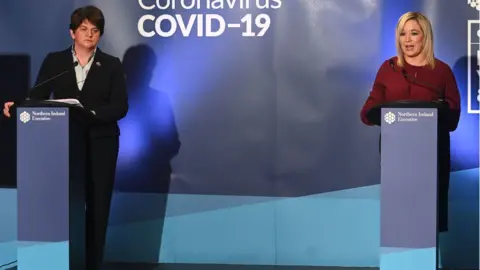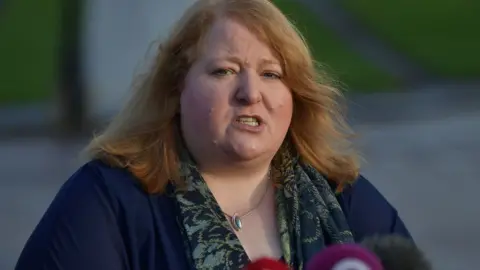Coronavirus: New regulations come into force
 Pacemaker
PacemakerNew powers to enforce guidelines on people staying at home and businesses staying closed have come into force in Northern Ireland.
The regulations were published by the NI Executive on Saturday.
They include the ability to force businesses to shut and crack down on people who leave their homes without a "reasonable excuse".
Penalties, ranging from fixed penalty notices to fines of up to £5,000, are being introduced as enforcement.
The maximum fine will be reserved for businesses but people could face a maximum fine of £960 if they do not comply.
Off licences have also been added to the list of essential businesses and can now stay open.

- EASY STEPS: How to keep safe
- A SIMPLE GUIDE: What are the symptoms?
- CONTAINMENT: What it means to self-isolate
- HEALTH MYTHS: The fake advice you should ignore
- MAPS AND CHARTS: Visual guide to the outbreak
- VIDEO: The 20-second hand wash

The new regulations bring Northern Ireland into line with the rest of the UK.
The regulations say that reasonable excuses to leave the home include to obtain necessities, such as food and medicine; exercise; to seek medical help; to provide care or assistance to a vulnerable person; to donate blood; and to travel for work, where it is not possible for that person to work from home.
These are consistent with previously announced guidelines, with Justice Minister Naomi Long saying the new regulations are "not a new direction in terms of what people should and shouldn't do".
However, she told BBC 5Live they do give the police and other bodies the power "to enforce where people do not comply with that voluntarily".
She added that the executive had to bring in the regulations "in order for us to use the powers which were legislated for earlier in the week".
 Getty Images
Getty ImagesTwo more people died in Northern Ireland on Saturday after testing positive for coronavirus.
It brought the total number of deaths in Northern Ireland to 15.
There are currently 324 confirmed cases of the virus throughout the province.
On Friday night Taoiseach (Irish prime minister) Leo Varadkar introduced a mandatory order for everyone to stay at home for a two-week period until 12 April, apart from certain exceptions, across the Republic of Ireland.
Mr Varadkar also introduced shielding or 'cocooning' for all those over 70 years of age and certain categories of people who are vulnerable to Covid-19 in the Republic.
'We will use every power we have'
First Minister Arlene Foster described the powers as "extraordinary" but said "we are living in extraordinary times".
"We are asking the people of Northern Ireland to make fundamental changes to how they live their lives," said Mrs Foster.
"But we are doing this to keep you safe, to flatten the curve of the Covid-19 infection so that the health service has the capacity to deal with those who need their help the most."
The first minister said the executive knows "the enormity" of what they are asking of the public.
Deputy First Minister Michelle O'Neill said "protecting the public, supporting the health service and saving lives" were the executive's priorities.
"Each one of us has a personal responsibility to do everything we can to fight back against Covid-19 for the good of everyone across society," she said.
"We will use every power we have to ensure people stay at home so that we save as many lives as we possibly can."
Health Minister Robin Swann said that the new powers were "an essential component of the strategy to tackle the pandemic and will ensure a consistent approach across the four regions of the UK".
 Getty Images
Getty ImagesNew guidance has also been issued on which businesses can stay open and which must stay shut, with off licences now allowed to continue to operate.
A previous list issued by the executive on Tuesday did not include off licences among businesses allowed to open, unlike the rest of the UK.
Some people had expressed concern, including SDLP assembly member Matthew O'Toole who wrote to ministers saying that "responsible drinkers were entitled to have a drink" and that those with alcohol problems could lose access to drink, leading to extra pressure on the health service.
The executive has also agreed that:
- Anyone who can work from home must work from home
- Employers must facilitate working from home where it is feasible
- No employer should compel an employee to come to work if it is feasible to work from home
- Every employer must take all reasonable steps to safeguard the health, safety and wellbeing of employees during the COVID-19 emergency, whether working from home or in the workplace
- Every employer must have particular regard to the safety of employees in the workplace and must put into effect the guidance on social distancing issued by the Department for the Economy
- Every employer has a legal duty to ensure, so far as it is reasonably practicable, the health, safety and welfare at work of all employees
- Where a business is failing to observe the Department for the Economy guidance and breaching the legal duty on health and safety, the statutory authorities will take robust action, which may include prosecution for criminal offences
- Where necessary, the Executive Office will also use its power of direction to close or restrict businesses that do not ensure the safety of their employees.